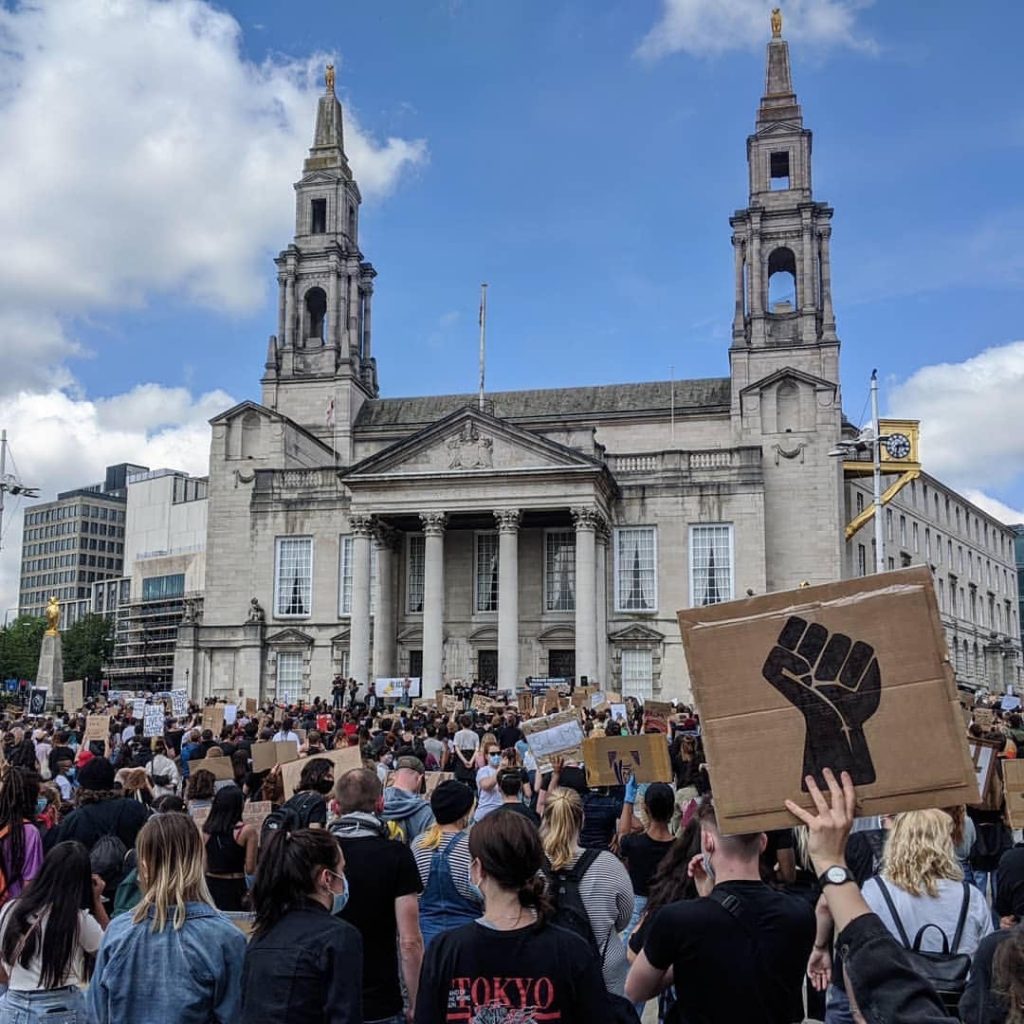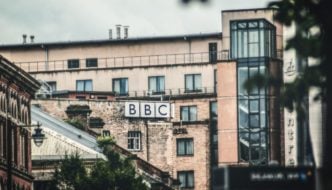
Black Lives Matter protest in Millennium Square, Leeds, taken by Quinn Daley (@pedantic_git)
When Boris Johnson says he is outraged by the killing of George Floyd, but claims that the UK has made ‘huge’ progress in fighting racism and advises people to stay away from Black Lives Matter protests in the UK, he deliberately undermines the seriousness of institutionalised anti-blackness in Britain. The immediate trigger for protests outside the US Embassy in London at the end of May was the graphic video of Floyd’s murder. However, the reason why thousands attended protests in cities including London, Leeds, Manchester and Bristol, was not only to express their anger at what happened to Floyd, but anger at how black people are treated here, at home.
Structural racism in the criminal justice system is something that the United States and the United Kingdom have in common. Hence, many protesters held up signs including ‘The UK Is Not Innocent’, along with the names of black people who have died in police custody. One of these names was that of Sean Rigg. Rigg was a talented musician from Brixton who suffered from mental health problems and died after his back and neck were restrained by the police in 2008. People have been raising awareness of Rigg’s death because of its striking similarities with the murder of Floyd.
Sean Rigg’s sister, Marcel Rigg, spoke publicly about her brother’s death recently, saying that when she saw the video of Derek Chauvin kneeling on Floyd’s neck, she immediately thought of her brother Sean “because that’s exactly what they did to him”. A similar case which people have also been raising awareness of on social media is the murder of Joy Gardner, a black woman from North London who died after being suffocated by immigration officers in her home in 1993. These two tragic deaths show how law-enforcement in Britain has a history of brutality against black people. People have been protesting institutional racism in Britain for decades.
What may be surprising is that racism in the criminal justice system in Britain is in some ways worse than in the United States. The Lammy Review published in 2017 concluded that, in proportion to the population, there are more black people in prisons in England and Wales than in prisons in the United States. Indeed, the report shows that in 2015, the Crown Court issued a greater number of prison sentences for drug offences to defendants from Black and Asian Minority Ethnic (BAME) backgrounds than white defendants. Furthermore, it also found that black people were placed at a disadvantage while in prison. For example, in youth prisons, young white teenagers are more likely than black teenagers to be recorded as having issues which explain disruptive behaviour, such as mental illness and learning difficulties. The Lammy Review drew up a list of recommendations to reduce the number of people from BAME backgrounds in prison, of which black people make up the greatest number.
Rather than implementing the changes called for in the Lammy Review, the Prime Minister has prioritised other issues like Brexit. Consequently, rather than progress being made, structural racism has worsened in the past couple of years. Today, black people are nine times more likely to be targeted by the police for stop and search than white people, up from six times more likely in 2017. During the lockdown, BAME people were 50 per cent more likely to be fined for breaking lockdown rules than white people. The facts speak for themselves.
Black people in Britain are also more likely to suffer from ill-health than white people, as is the case in the United States. A leaked report from Public Health England concluded that racism has contributed to higher death rates from COVID-19 amongst BAME people. To name but one example, black people are more likely to occupy key worker jobs. People have been demanding justice for Belly Mujinga, a black railway worker who died from COVID-19 after being spat and coughed at during her shift at London Victoria Station. After the British Transport Police decided not to prosecute anyone over the incident but pressed charges following the death of a white essential worker under similar circumstances, over 1.6 million people signed a petition calling for the case to be re-opened. Consequently, the Crown Prosecution Service have agreed to conduct an independent review of the incident – showing the power of campaigning.
The Black Lives Matter movement isn’t going anywhere. With public attitudes increasingly in favour of the movement, the government can no longer pretend that anti-blackness is an American issue. While some sections of the media portray Black Lives Matter as a movement that is merely concerned with cancelling offensive TV shows, it is important that the public keep sight of the most damaging issues at hand: structural racism in the criminal justice system and racial disparities in health and wellbeing. Accordingly, we need to continue to place pressure on the government, be it through protesting, signing petitions and/or writing to our MPs, so that justice may be granted to victims and institutions can be held to account.
A list of resources to help fight racism in the UK may be found here.
Filed under: Community, Politics
Tagged with: BAME, black, black lives matter, BLM, Boris Johnson, brutality, covid-19, criminal justice system, lockdown, police, politics, prison, Racism, structural racism, white



Comments